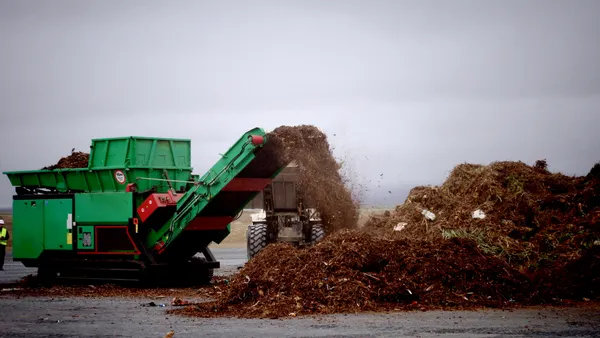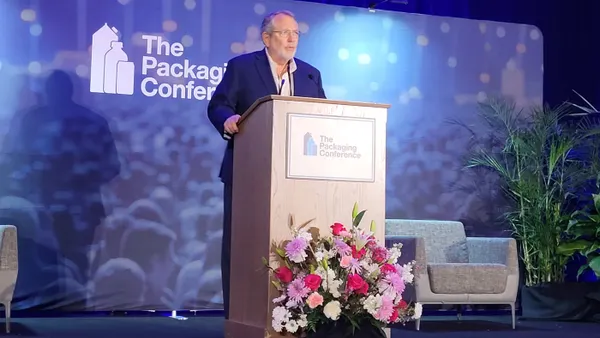Dive Brief:
- A federal court on Friday granted the Oregon Department of Environmental Quality and Oregon Environmental Commission an extension in responding to a complaint filed by the National Association of Wholesaler-Distributors. That lawsuit challenges the constitutionality of Oregon’s extended producer responsibility for packaging law.
- Defendants are now required to respond to the lawsuit by Sept. 19. DEQ told Packaging Dive it is not able to comment on pending litigation.
- NAW says it’s also analyzing other states’ programs for potential legal action. While NAW is currently most focused on the Oregon lawsuit, Karen Harned, NAW’s director of litigation and legal policy, anticipates issues in other states, too. Seven U.S. states to date have adopted packaging EPR laws.
Dive Insight:
NAW, represented by attorneys from Sidley Austin as well as Bradley Bernstein Sands, filed its lawsuit in the U.S. District Court for the District of Oregon on July 30 — about a month after Oregon’s program officially kicked off on July 1. The complaint named Oregon DEQ, the Oregon Environmental Commission and Oregon’s attorney general as defendants. It alleges that Oregon’s packaging EPR program is “unconstitutional,” citing nondelegation doctrine, federal dormant commerce clause, federal unconstitutional conditions doctrine and federal and state due process.
Wholesalers don’t believe they should be considered producers — such entities function as a “middle man” said Harned earlier this month.
“We're the ones that take the product from the manufacturer or the producer and bundle it according to one of our clients’ specifications, and send it off,” Harned said. “We think that we're the least likely person in the supply chain that should be having ... these regulatory burdens placed upon us, setting aside all the legal reasons why we think the law is problematic.”
DLA Piper attorneys noted after the complaint was filed that the lawsuit had the potential to disrupt upcoming compliance timelines, potentially through a temporary restraining order or preliminary injunction.
Jesse Medlong, an attorney with DLA Piper, who is not involved in the case, noted that Oregon’s Recycling Modernization Act “is not a big outlier” among such state policies, and in multiple instances it’s “almost verbatim the same as other EPR packaging laws.” Especially given some of the federal claims included in NAW’s challenge, if this lawsuit goes forward, other lawsuits could likely follow on similar basis, he said.
Medlong said he’s not aware of other significant court challenges to EPR laws elsewhere, and also that the legal theories invoked in NAW’s case aren’t surprising. It was clearly important to plaintiffs to include federal questions, he said. “I think ultimately, if this litigation proceeds, the goal is to keep it moving up to the appellate chain.”
Harned said wholesalers were taken aback by the RMA. “We've seen these laws, but we didn't really think they applied to our members. And then as it got closer, we saw that it did. We were getting more and more questions from our members on how it was going to work,” Harned said. “We shared those questions with Oregon Department of Environmental Quality in June and asked them to delay the effective date of the rule because there were just so many outstanding questions that were still there.”
Upon further examination, Harned and partners thought they had a legal case.
“As soon as we could, we filed,” she said. “[We] would we have liked to have been able to file a year ago, but we filed as soon as we were able to file.”
Harned said that while the RMA may be “well intentioned,” NAW believes that including wholesalers and distributors is “saddling those that have the least control over product packaging.”
Harned said she hopes other business groups will support NAW’s effort. Regardless of the degree of financial impact, “You should be concerned about what Oregon is doing here,” she said. “This is really troubling that they're outsourcing so much of their legislative power.”
For now, producers are on the hook. Oregon DEQ recently disclosed a list of the top 25 largest producers in the state.
DLA Piper would advise clients to proceed as though the RMA will continue to be in effect. Even if the state ultimately has to go back to the drawing board in some way, “the drawing board in this instance is not going to be a clean slate.”
“I think it's unlikely that the outcome is Oregon cannot have any EPR program for packaging,” Medlong said. “But beyond that very high threshold, it's very difficult to say what will happen.”













